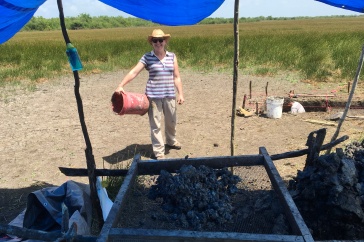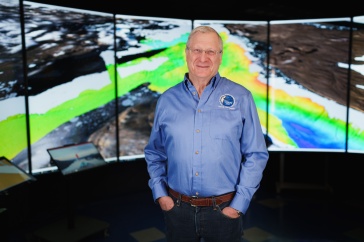
UNH scientists have been awarded a Rapid Response Research (RAPID) grant from the National Science Foundation to advance our understanding of extreme, global-scale events on tropical ecosystems. Their study will measure the impacts of this year’s colossal Saharan dust storm — thought to be the largest in 50 years and dubbed “Godzilla” by meteorologists — on watersheds in the Luquillo Mountains of Puerto Rico.
Every year from late spring to early fall, dust from the Sahara and Sahel Deserts travels from Africa across the Atlantic, Caribbean and Gulf of Mexico. The dust provides an important source of calcium, magnesium, and phosphorous to Puerto Rico’s tropical ecosystems, but much is often lost to precipitation and streamflow. This year, when the Godzilla storm arrived in the Caribbean around June 23, it created a unique opportunity to find out how an abnormally large amount of dust-derived nutrients will compensate for those normal loses and affect the island’s forests and streams.
“It is important to understand how tropical ecosystems and watersheds function and respond to events like the dust storm because they play a critical role in the global carbon cycle, yet their ability to store carbon is often limited by a lack of nutrients like calcium and phosphorous,” says Adam Wymore, research assistant professor of natural resources and the environment and the project’s co-PI, along with Bill McDowell, professor of environmental sciences. “The effects of the dust storm could be significant for landscapes like the Luquillo Mountains. With large inputs of these nutrients, we expect to eventually see increases in processes — like plant and tree growth — that consume carbon dioxide. In streams, nutrients from the storm could benefit food webs, leading to increases in aquatic lifeforms, like insects and shrimp.”
“It is important to understand how tropical ecosystems and watersheds function and respond to events like the dust storm because they play a critical role in the global carbon cycle..”
With almost $200,000 in RAPID funding, Wymore and McDowell will examine three aspects of watershed biogeochemistry that will allow them to connect the dust inputs to soils and groundwater, the stream network and the behavior of the stream ecosystem.
Faculty and students from the University of Puerto Rico will be involved in multiple aspects of the project.
“Ecosystems, watersheds, and landscapes are constantly affected by forces that originate outside of their region,” says Wymore. “Precipitation in the northeastern United States can originate as hurricanes or tropical depressions off the coast of West Africa, dust from the Gobi Desert in Asia provides nutrients to the western mountain of the United States. Understanding this global connectivity is critical to being able to accurately predict how ecosystems will respond to future change and disturbance.”
RAPID grants provide immediate funding for research needs that arise suddenly, such as in the aftermath of a natural disaster or extreme event where sampling as close as possible to the event is necessary to understand the impacts.
-
Written By:
Sarah Schaier | College of Life Sciences and Agriculture
















































